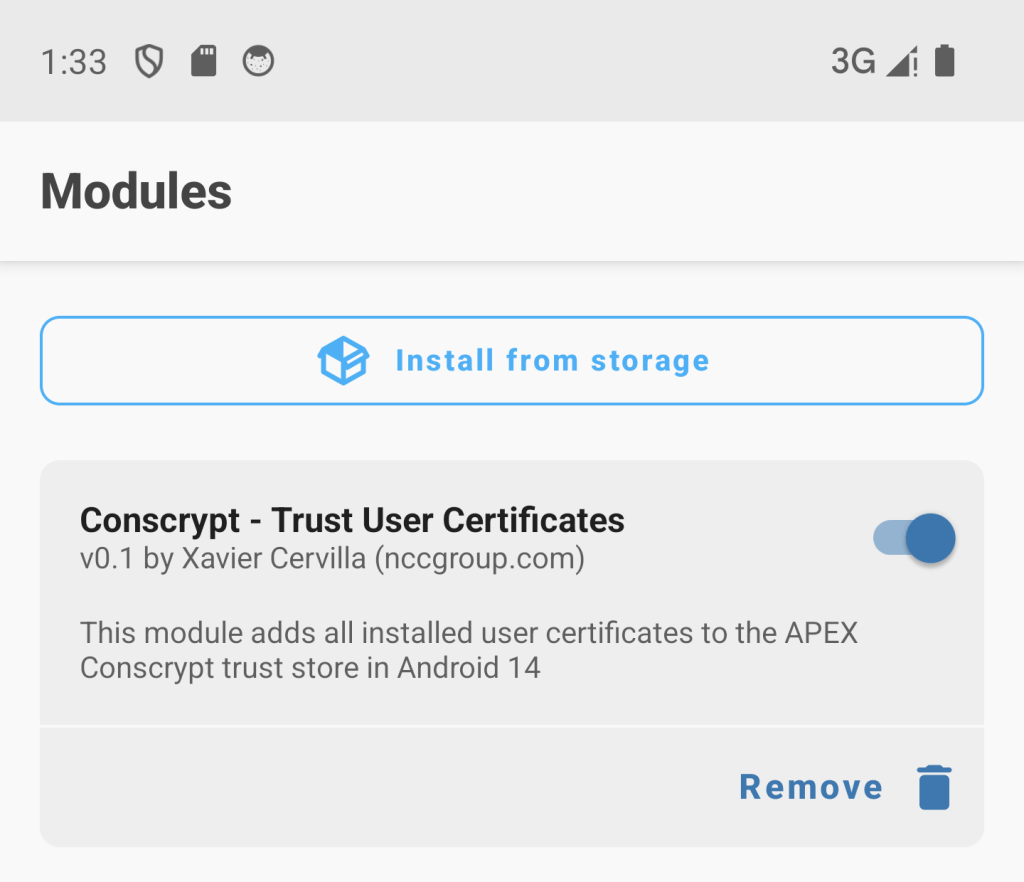
2023-11-8 22:31:13 Author: research.nccgroup.com(查看原文) 阅读量:18 收藏
Android 14 introduced a new feature which allows to remotely install CA certificates. This change implies that instead of using the /system/etc/security/cacerts directory to check the trusted CA’s, this new feature uses the com.android.conscrypt APEX module, and reads the certificates from the directory /apex/com.android.conscrypt/cacerts.
Inspired by this blog post by Tim Perry, I decided to create a Magisk module that would automate the work required to intercept traffic on Android 14 with tooling such as Burp Suite, and that uses the installed user certificates in a similar fashion as the MagiskTrustUserCerts module does.
This Magisk module makes all installed user CA’s part of the Conscrypt APEX module’s CA certificates, so that they will automatically be used when building the trust chain on Android 14.
The Magisk module is available for download from https://github.com/nccgroup/ConscryptTrustUserCerts
Note: It should be noted that if an application has implemented SSL Pinning, it would not be possible to intercept the HTTPS traffic.
The Android Pony EXpress (APEX) container format was introduced in Android 10 and it is used in the install flow for lower-level system modules. This format facilitates the updates of system components that do not fit into the standard Android application model. Some example components are native services and libraries, hardware abstraction layers (HALs), runtime (ART), and class libraries.
With the introduction of APEX, system libraries in Android can be updated individually like Android apps. The main benefit of this is that system components can be individually updated via the Android Package Manager instead of having to wait for a full system update.
Source: https://source.android.com/docs/core/ota/apex
The Conscrypt module (com.android.conscrypt) is distributed as an APEX file and it is used as a Java Security Provider. On Android 14, an updatable root trust store has been introduced within Conscrypt. This allows for faster CA updates allowing to revoke trust of problematic or failing CAs on all Android 14 devices.
Source: https://source.android.com/docs/core/ota/modular-system/conscrypt
The script that appears on Tim Perry’s blog post was used as the template for the module, but some modifications were required in order to use it as a Magisk module.
In Magisk, boot scripts can be run in 2 different modes: post-fs-data and late_start service mode. As it was required that the Zygote process was started, the boot script was set to be run in the late_start service mode.
To ensure that the boot process was completed before we mounted our CA certificates over the Conscrypt directory inside Zygote’s mount namespace, the system property sys.boot_completed was used to check that the process finished, as it is set to 1 once the whole boot process is completed.
The following piece of code was added at the beginning of the script:
while [ "$(getprop sys.boot_completed)" != 1 ]; do
/system/bin/sleep 1s
doneThe script was also modified in order to use the user installed CA’s with the following code:
cp /data/misc/user/0/cacerts-added/* /data/local/tmp/tmp-ca-copy/Once we had done the prior modifications, we had a functional Magisk module to intercept HTTPS traffic on Android 14.

Daniel Romero for his support throughout the research process.
Here are some related articles you may find interesting
Post-exploiting a compromised etcd – Full control over the cluster and its nodes
Kubernetes is essentially a framework of various services that make up its typical architecture, which can be divided into two roles: the control-plane, which serves as a central control hub and hosts most of the components, and the nodes or workers, where containers and their respective workloads are executed. Within…
D0nut encrypt me, I have a wife and no backups
Unveiling the Dark Side: A Deep Dive into Active Ransomware Families Author: Ross Inman (@rdi_x64) Introduction Our technical experts have written a blog series focused on Tactics, Techniques and Procedures (TTP’s) deployed by four ransomware families recently observed during NCC Group’s incident response engagements. In case you missed it, last…
Popping Blisters for research: An overview of past payloads and exploring recent developments
Summary Blister is a piece of malware that loads a payload embedded inside it. We provide an overview of payloads dropped by the Blister loader based on 137 unpacked samples from the past one and a half years and take a look at recent activity of Blister. The overview shows…
View articles by category
如有侵权请联系:admin#unsafe.sh